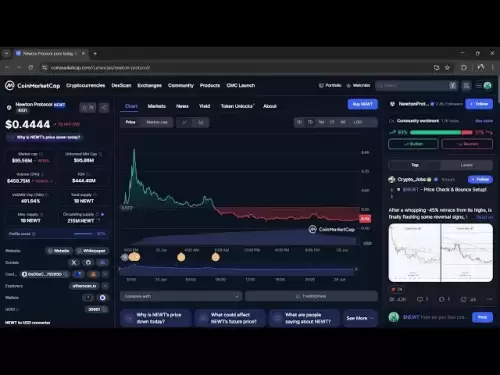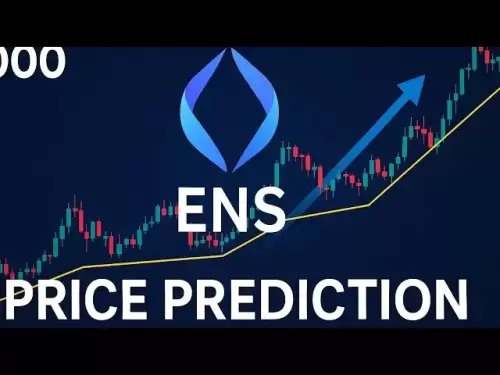-
 Bitcoin
Bitcoin $107,467.9126
1.26% -
 Ethereum
Ethereum $2,447.5288
-0.12% -
 Tether USDt
Tether USDt $1.0005
0.00% -
 XRP
XRP $2.1921
0.13% -
 BNB
BNB $647.2897
0.50% -
 Solana
Solana $144.8627
-0.37% -
 USDC
USDC $0.9996
-0.03% -
 TRON
TRON $0.2732
0.10% -
 Dogecoin
Dogecoin $0.1652
-0.18% -
 Cardano
Cardano $0.5700
-2.87% -
 Hyperliquid
Hyperliquid $37.0274
-1.81% -
 Bitcoin Cash
Bitcoin Cash $484.6957
0.19% -
 Sui
Sui $2.7354
-2.19% -
 Chainlink
Chainlink $13.1727
-1.49% -
 UNUS SED LEO
UNUS SED LEO $8.9978
-0.04% -
 Stellar
Stellar $0.2421
-2.33% -
 Avalanche
Avalanche $17.5633
-3.51% -
 Toncoin
Toncoin $2.8476
-1.94% -
 Shiba Inu
Shiba Inu $0.0...01166
-0.56% -
 Litecoin
Litecoin $85.1071
0.09% -
 Hedera
Hedera $0.1502
-2.96% -
 Monero
Monero $310.2774
-1.64% -
 Dai
Dai $0.9999
-0.01% -
 Polkadot
Polkadot $3.3584
-1.88% -
 Ethena USDe
Ethena USDe $1.0003
-0.04% -
 Bitget Token
Bitget Token $4.4443
2.90% -
 Pi
Pi $0.6242
14.04% -
 Uniswap
Uniswap $6.9774
-2.86% -
 Pepe
Pepe $0.0...09535
-5.05% -
 Aave
Aave $256.7574
-3.35%
Will Dual Currency Investment Lose Money?
Dual currency investment involves speculating on exchange rate fluctuations between two distinct currencies, aiming to capitalize on both appreciation and depreciation for potential profits.
Jan 11, 2025 at 06:20 pm
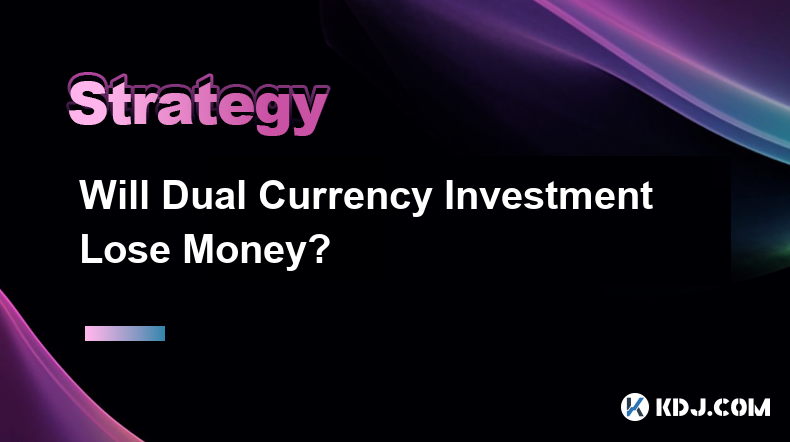
Key Points:
- Understanding Dual Currency Investment
- Risks and Considerations
- Strategies for Maximizing Gains
- Role of Economic Indicators
- Market Analysis for Informed Decisions
- FAQs on Dual Currency Investment
Understanding Dual Currency Investment
Dual currency investment involves holding two distinct currencies in an investment portfolio. The goal is to capitalize on exchange rate fluctuations and potentially earn profits from both appreciation and depreciation. Investors speculate on changes in the relative value of the two currencies, buying the one expected to appreciate and selling the other expected to depreciate.
Types of Dual Currency Investments
- Spot Contracts: Immediate exchange of currencies at the current market rate.
- Forward Contracts: Agreement to exchange currencies at a predetermined rate in the future.
- Currency Options: Right, but not obligation, to buy or sell currencies at a specific price.
Risks and Considerations
Dual currency investment carries inherent risks:
- Exchange Rate Volatility: Fluctuations in currency exchange rates can lead to significant losses.
- Interest Rate Differentials: Differences in interest rates between the two countries can affect investment returns.
- Political and Economic Events: News announcements, political instability, and economic data can influence exchange rates.
- Transaction Costs: Currency exchange and other fees can eat into profits.
Strategies for Maximizing Gains
To mitigate risks and enhance profits, consider the following strategies:
- Thorough Research: Analyze economic indicators, geopolitical events, and market trends.
- Diversification: Allocate funds across multiple currency pairs to reduce risk.
- Hedging: Use sophisticated financial instruments like currency futures to protect against adverse exchange rate movements.
- Patience and Timing: Currency fluctuations can take time. Avoid impulsive trades and seize opportunities based on data and analysis.
Role of Economic Indicators
Economic indicators provide valuable insights into potential currency movements:
- GDP: Measures overall economic growth and influences currency value.
- Inflation: Rising prices can weaken a currency, while low inflation supports its strength.
- Interest Rates: Higher interest rates attract capital inflows, strengthening the currency.
- Employment Data: Strong employment levels indicate economic stability and support currency appreciation.
Market Analysis for Informed Decisions
Technical and fundamental analysis aid in making informed investment decisions:
- Technical Analysis: Charts and indicators reveal historical price patterns and predict future trends.
- Fundamental Analysis: Examines economic data, company reports, and geopolitical events to assess currency valuations.
FAQs on Dual Currency Investment
Q: Can I lose money in dual currency investment?
A: Yes, volatility and adverse exchange rate movements can result in losses.
Q: Which economic indicators are most influential?
A: GDP, inflation, interest rates, and employment data play significant roles.
Q: What are common strategies to reduce risk?
A: Diversification, hedging, and research help mitigate potential risks.
Q: How long should I hold dual currency investments?
A: Holding periods can vary depending on market conditions and investment goals.
Q: Is dual currency investment suitable for all investors?
A: It requires an understanding of currency markets, risk tolerance, and proper due diligence.
Disclaimer:info@kdj.com
The information provided is not trading advice. kdj.com does not assume any responsibility for any investments made based on the information provided in this article. Cryptocurrencies are highly volatile and it is highly recommended that you invest with caution after thorough research!
If you believe that the content used on this website infringes your copyright, please contact us immediately (info@kdj.com) and we will delete it promptly.
- BNB Price Check: Can Binance Coin Reserves Fuel a Rally to $800?
- 2025-06-26 20:25:12
- PEPD, Memes, and Ethereum: A New Era of Meme Utility?
- 2025-06-26 20:25:12
- DOGE, BlockDAG, and Coin Airdrops: The New Wave of Crypto Opportunities
- 2025-06-26 18:45:12
- Neo Pepe and the Crypto Presales Popping in June 2025
- 2025-06-26 18:45:12
- Bitcoin, DeFi Tokens, and Relist Moves: What's Hot in Crypto Right Now
- 2025-06-26 18:30:11
- Binance, Bitcoin, and Altcoins: Navigating the Crypto Landscape
- 2025-06-26 19:05:12
Related knowledge

What are the skills of Bitcoin option hedging? Practical case sharing
Jun 24,2025 at 04:01pm
Understanding Bitcoin Option HedgingBitcoin option hedging is a risk management strategy used by traders and investors to protect their positions in the volatile cryptocurrency market. By using options, individuals can limit potential losses while retaining the opportunity for profit. In essence, it allows one to insulate against adverse price movements...
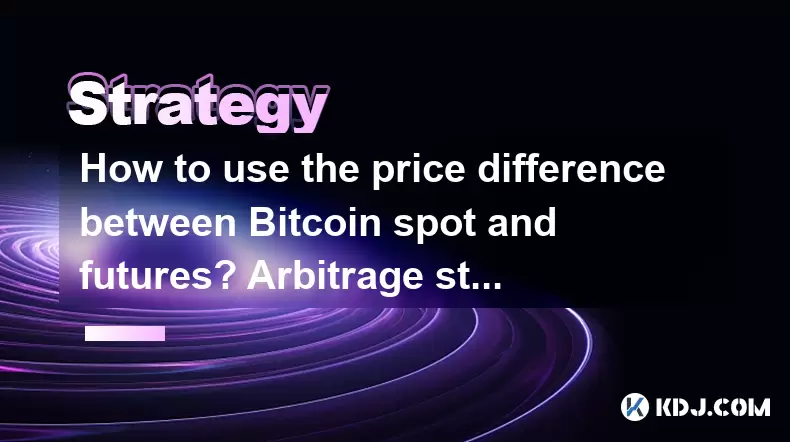
How to use the price difference between Bitcoin spot and futures? Arbitrage strategy
Jun 20,2025 at 02:56pm
Understanding Bitcoin Spot and Futures MarketsTo effectively leverage arbitrage opportunities between Bitcoin spot and futures markets, it's essential to understand the fundamental differences between these two types of markets. The spot market refers to the direct buying and selling of Bitcoin for immediate delivery at the current market price. In cont...
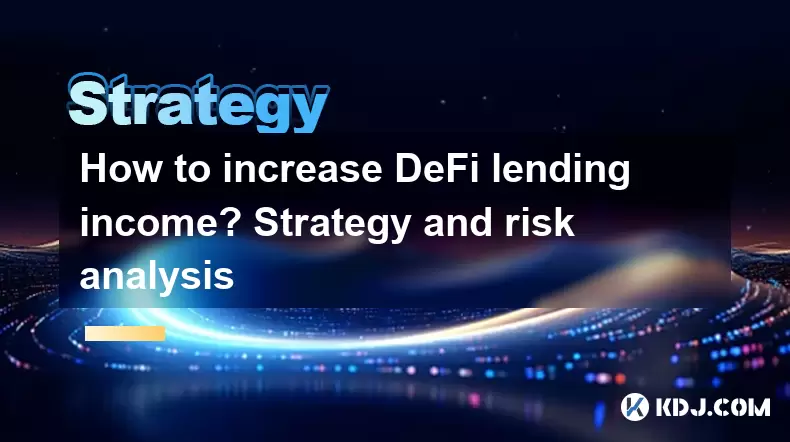
How to increase DeFi lending income? Strategy and risk analysis
Jun 24,2025 at 02:08pm
Understanding DeFi Lending and Its Income PotentialDeFi (Decentralized Finance) lending has emerged as a popular way to earn passive income in the cryptocurrency space. Unlike traditional banking systems, DeFi lending platforms allow users to lend their crypto assets directly to borrowers without intermediaries. The lenders earn interest based on the su...
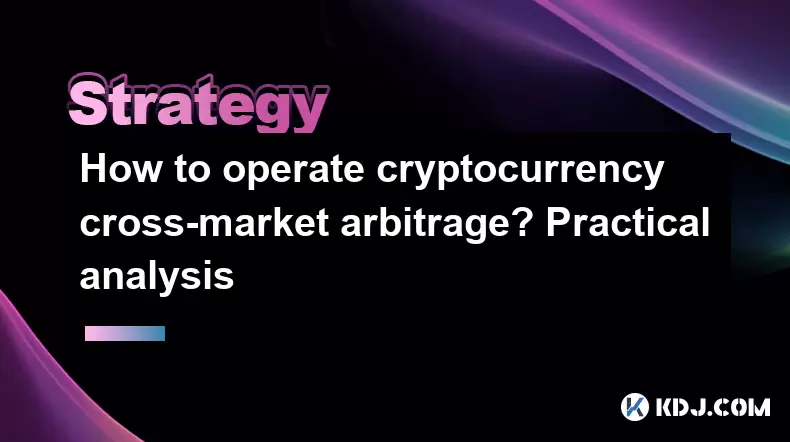
How to operate cryptocurrency cross-market arbitrage? Practical analysis
Jun 23,2025 at 04:01am
Understanding Cryptocurrency Cross-Market ArbitrageCryptocurrency cross-market arbitrage involves taking advantage of price differences for the same digital asset across different exchanges. The core idea is to buy low on one exchange and sell high on another, capturing the profit from the discrepancy. This strategy relies heavily on real-time market da...

How to make profits from high-frequency cryptocurrency trading? Sharing core skills
Jun 19,2025 at 05:07pm
Understanding High-Frequency Cryptocurrency TradingHigh-frequency trading (HFT) in the cryptocurrency market involves executing a large number of trades at extremely fast speeds, often within milliseconds. This method relies on small price discrepancies across exchanges or within a single exchange’s order book. Traders use complex algorithms and ultra-l...

What are the methods of cryptocurrency quantitative trading? Detailed analysis
Jun 22,2025 at 11:07pm
Understanding the Core of Cryptocurrency Quantitative TradingCryptocurrency quantitative trading refers to the use of mathematical models and algorithms to execute trades in the digital asset market. Unlike traditional discretionary trading, which relies heavily on human judgment, quantitative trading leverages data-driven strategies to identify profita...

What are the skills of Bitcoin option hedging? Practical case sharing
Jun 24,2025 at 04:01pm
Understanding Bitcoin Option HedgingBitcoin option hedging is a risk management strategy used by traders and investors to protect their positions in the volatile cryptocurrency market. By using options, individuals can limit potential losses while retaining the opportunity for profit. In essence, it allows one to insulate against adverse price movements...

How to use the price difference between Bitcoin spot and futures? Arbitrage strategy
Jun 20,2025 at 02:56pm
Understanding Bitcoin Spot and Futures MarketsTo effectively leverage arbitrage opportunities between Bitcoin spot and futures markets, it's essential to understand the fundamental differences between these two types of markets. The spot market refers to the direct buying and selling of Bitcoin for immediate delivery at the current market price. In cont...

How to increase DeFi lending income? Strategy and risk analysis
Jun 24,2025 at 02:08pm
Understanding DeFi Lending and Its Income PotentialDeFi (Decentralized Finance) lending has emerged as a popular way to earn passive income in the cryptocurrency space. Unlike traditional banking systems, DeFi lending platforms allow users to lend their crypto assets directly to borrowers without intermediaries. The lenders earn interest based on the su...

How to operate cryptocurrency cross-market arbitrage? Practical analysis
Jun 23,2025 at 04:01am
Understanding Cryptocurrency Cross-Market ArbitrageCryptocurrency cross-market arbitrage involves taking advantage of price differences for the same digital asset across different exchanges. The core idea is to buy low on one exchange and sell high on another, capturing the profit from the discrepancy. This strategy relies heavily on real-time market da...

How to make profits from high-frequency cryptocurrency trading? Sharing core skills
Jun 19,2025 at 05:07pm
Understanding High-Frequency Cryptocurrency TradingHigh-frequency trading (HFT) in the cryptocurrency market involves executing a large number of trades at extremely fast speeds, often within milliseconds. This method relies on small price discrepancies across exchanges or within a single exchange’s order book. Traders use complex algorithms and ultra-l...

What are the methods of cryptocurrency quantitative trading? Detailed analysis
Jun 22,2025 at 11:07pm
Understanding the Core of Cryptocurrency Quantitative TradingCryptocurrency quantitative trading refers to the use of mathematical models and algorithms to execute trades in the digital asset market. Unlike traditional discretionary trading, which relies heavily on human judgment, quantitative trading leverages data-driven strategies to identify profita...
See all articles




















